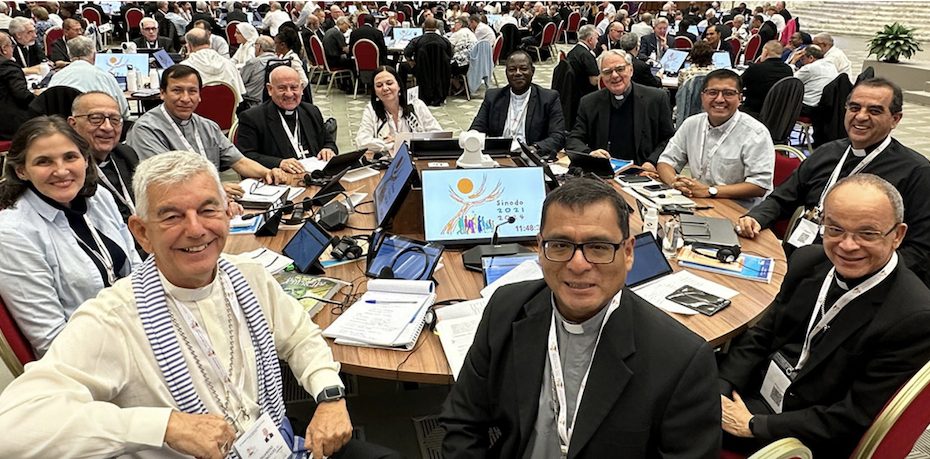Bishop Enrique “Kike” Figerado SJ
RAOEN shares this article (originally uploaded in Jesuits Global) from Bishop Kike, pastor of the Apostolic Prefecture of Battambang in Cambodia, who wrote about his experience at the General Assembly of the Synod on Synodality in the Church in Rome.
In the ecumenical prayer with which he opened the Synod, Pope Francis urged us to imagine that we are “like the early Christian community on the Day of Pentecost. Like one flock, loved and gathered by one Shepherd, Jesus. Like the great crowd in the Book of Revelation we are here, brothers and sisters, “from every nation, from all tribes and peoples and languages” (Rev7:9), from different communities and countries, daughters and sons of the same Father, inspired by the Spirit received in baptism, and called to the same hope (cf Eph 4:4-5).”
The synodal process is not a new idea; it has always been in the Church since the very first Christian communities. What we are trying to do now is to reinforce this way of proceeding in the Church, in accord with the spirit of the Second Vatican Council. We are trying to recover the spirit of solidarity to which the Church has been called from its beginnings. We want a Church that is more fraternal and more missionary, a Church with more participation and more communion.
The Pope also invited us to an attitude of prayer and silence: “The Acts of the Apostles says that after Peter’s discourse to the Council of Jerusalem, “the whole assembly kept silence” (Acts15:12), preparing to receive the testimony of Paul and Barnabas about the signs and wonders God had performed among the nations. This reminds us that silence, in the ecclesial community, makes fraternal communication possible, where the Holy Spirit draws together points of view, because he is harmony.”
First week of the Synod
We have been on this journey since 2021, and now we are experiencing one more stage in the process: the XVI Ordinary General Assembly of the Synod of Bishops. There is great joy in meeting together, participating, and seeing each other’s faces as we grow in friendship and mutual sharing. In this synod we are in a process of responding to God’s call, as brothers and sisters of the same merciful Father. With tenderness and mercy God calls us to build fraternity, inclusiveness, justice and peace in the world. The dynamism of God’s love deepens our sense of vocation. With our gaze fixed on Jesus and his mercy, we rejoice in the greater participation of persons who were not previously included in these conversations: women, lay people, church leaders, and leaders with disabilities. Together we pray and discern, together we continue to deepen our understanding of God’s love.
We have advanced from being prisoners of doctrine to listening with our heart, which enlightens the intellect. I feel that we are all enlightened by this assembly. In this synodal process, God’s love fills our hearts and gives us the grace of new wisdom. God is giving us a new vision and doctrine of the Church, one that is born of charity and love, where the pastoral priority is that the Church is for all.
My experience of these days is that the signs of the times make us keep the poor at the centre, for they are the suffering body of Christ. We keep at the centre those who are poor, whether spiritually and physically, such as forced migrants, victims of war, or victims of abuse. Thanks to this dynamic, the wounds of the Lord are placed at the centre. As the Church accompanies, heals and rehabilitates, it is invited to abasement and humility. This is the way that has been taught to us by the Lord who suffered with the poor in his incarnation. We also are invited to suffer with the poor, to hope with the poor and to experience resurrection with the poor as we joyfully accept God’s blessings.
This first week of the General Assembly has been a time of listening and hope, of growing in faith and of building up the Church, making it a place of universal brotherhood.


